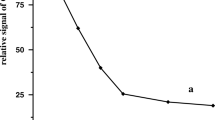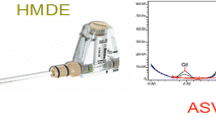Abstract
Possibilities to increase the sensitivity of stripping analysis by optimising the hydrodynamic conditions of the solution during the deposition and rest period are evaluated. Rotation rates as high as 13 000 rpm can be applied during the deposition step at a mercury film rotating disc electrode for Zn, Cd, Pb, In and Tl determinations when 10–20 mg/l of Hg2+ for the renewal of the mercury film is added. Because of the extreme sensitivity on the properties of the mercury film in the case of Ga only 4000–5000 rpm are recommended. The highest stirring efficiencies using a magnetic stirrer are equivalent to 2500–3000 rpm when a rotating disc electrode is used. The effect of the duration of the rest period is not significant for square wave stripping voltammetry, however, analytical signals can be increased 10 and more times when potentiometric stripping analysis is applied.
Similar content being viewed by others
Author information
Authors and Affiliations
Rights and permissions
About this article
Cite this article
Armalis, S., Pockeviči¯utė, D. & Tatolytė, O. Influence of hydrodynamic conditions of the solution on the sensitivity of stripping analysis of trace metals. Fresenius J Anal Chem 354, 696–698 (1996). https://doi.org/10.1007/s0021663540696
Received:
Revised:
Accepted:
Issue Date:
DOI: https://doi.org/10.1007/s0021663540696




